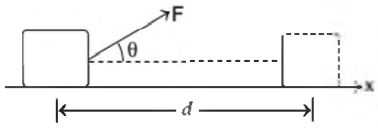Work
A farmer ploughing the field, a construction worker carrying bricks, a student studying for a competitive examination, an artist painting a beautiful landscape, all are said to be working. In physics, however, the word ‘Work’ covers a definite and precise meaning. Work refers to the force and the displacement over which it acts. Consider a constant force `F` acting on an object of mass `m`. The object undergoes a displacement `d` in the positive `x`-direction as shown in figure.

The work done by the force is defined to be the product of component of the force in the direction of the displacement and the magnitude of this displacement, thus `W=(F cos theta)d = F•d.`
Which of the following statement(s) is/are correct for work done to be zero?
I. If the displacement is zero. II. If force applied is zero. III. If force and displacement are
mutually perpendicular to each other,
Options:
(a) Only I
(b) I and II
(c) Only II
(d) I, II and III